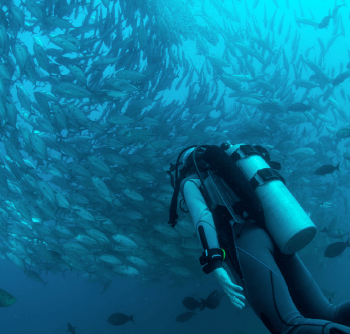Overview
Marine biologists study aquatic organisms and their habitats.

What responsibilities will I have?
- Design controlled laboratory and natural field experiments to meet objectives
- Observe marine wildlife and organisms in their natural habitats
- Inventory specific populations over periods of time
- Collect water, mineral and plant samples to test in a laboratory setting
- Measure water conditions to determine the value of life for aquatic organisms
- Dissect and preserve marine life as well as samples for current and future studies
- Study aquatic life diseases and create plans to control outbreaks
- Monitor environmental pollution and create plans to notify government officials
- Utilize various laboratory equipment and tools as well as computer software programs
- Oversee activity and duties of assisting marine technicians
- Follow up with employer and invested third parties with research findings
- Write and publish journals or reports on research findings
- Oversee the care and maintenance of aquatic animals in captivity or raised for research purposes
- Serve as an expert regarding marine conservation and aquaculture practices
What education and training is required?
A minimum of a bachelor’s degree in marine biology or a closely related field is required to become a marine biologist. A master’s degree is often preferred, however.
To pursue a career as a Marine Biologist:
The following high school courses are recommended: agricultural education, biology, earth science, and mathematics.
Where can I work?
Aquaculture production farms, government agencies, universities, zoos, aquariums, and research firms employ marine biologists.
Future Job Market / Outlook
The future outlook for a marine biologist will be fair over the next five years.
Suggested Professional Organizations and Associations
- MarineBio Conservation Society
- Society for Conservation Biology
- American Institute of Biological Sciences
- National Association of Marine Laboratories